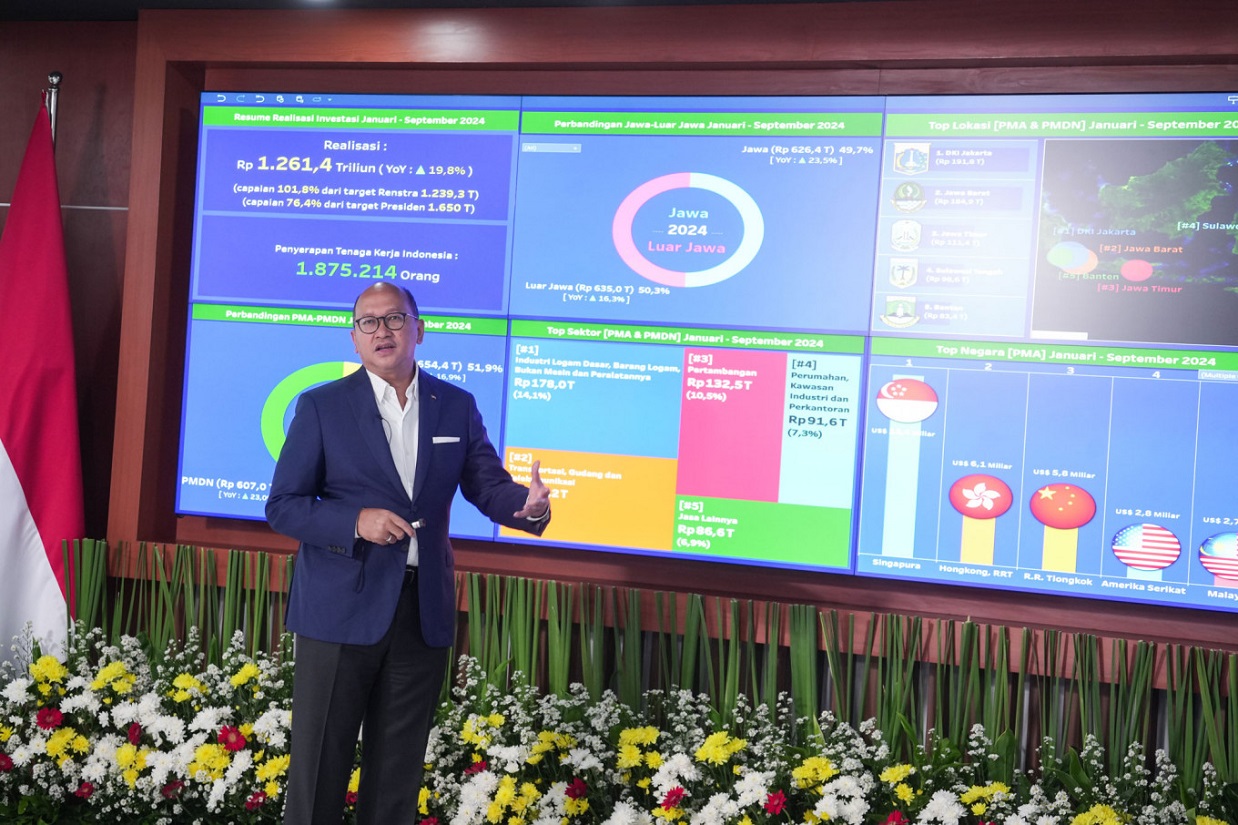News
Investment Realization Grows, Downstreaming Kicks Off: Minister Rosan
Front Row (The Jakarta Post) October 28, 2024 (Investment Ministry/BKPM)
(Investment Ministry/BKPM)
Investment realization is showing a positive trend in line with a projection from the World Bank that Indonesia's economy would grow 5.0 percent this year, as evident in a report on third-quarter (Q3) investments released on Oct. 15, 2024 by the Investment Ministry/Investment Coordinating Board (BKPM).
Investment Minister/BKPM Head Rosan P. Roeslani said investment performance in the July-September period was strongly influenced by the government's consistent policy downstreaming, which he said was key to investment growth because it increased added value and jobs.
"Downstreaming plays a vital role in boosting investment in Indonesia. Most importantly, it allows us to produce higher value-added products and create jobs," the minister said on Oct. 17, 2024, in Jakarta, addressing a press conference on “Q3 2024 Investment Realization and 10 Years of the Jokowi Government’s Achievements”.
According to data from the Investment Ministry /BKPM, the third quarter of 2024 recorded investment realization of Rp 431.48 trillion (US$27.79 billion), or a year-on-year (yoy) increase of 15.24 percent, with the downstream sector contributing Rp 91.51 trillion, or 21.2 percent of third-quarter investment.
This investment realization contributed to 26.15 percent of the full-year investment target for 2024 and created 650,172 jobs.
"We can see that these downstreaming figures remain consistently above 20 percent on a quarterly, annual and five-year basis. This demonstrates that President Joko Widodo's downstreaming policy has had a very positive impact," Rosan said.
Domestic direct investment (DDI) rose 11.62 percent yoy in the third quarter from Rp178.20 trillion to Rp198.83 trillion, while foreign direct investment (FDI) grew 18.55 percent yoy from Rp 196.20 trillion to Rp232.65 trillion, with FDI contributing 53.92 percent to Q3 2024 investment.
The top five countries in terms of FDI flow were Singapore (UUS$5.50 billion), Hong Kong (US$2.24 billion), China (US$1.86 billion), Malaysia (US$990 million) and the United States (US$840 million).
The largest contributors to investment by business sector were the transportation, warehousing, and telecommunications sector with Rp 58.04 trillion), followed by the basic metals industry with Rp 55.87 trillion, the mining sector with Rp 44.64 trillion, the chemical and pharmaceutical industry with Rp 31.61 trillion and the food industry with Rp 31.30 trillion.
In line with the strong performance in the third quarter, cumulative investment realization during the January-September period also showed positive results. While this indicates that Indonesia is on track to meet its full-year investment target by the end of 2024, optimism is growing that this target will be exceeded on the back of investment realization in the first nine months.
"Realization has reached Rp 1.261 quadrillion, nearly 20 percent higher year-on-year. Of the year-end target of Rp 1.650 quadrillion, 76.4 percent has been met already. In fact, speaking about the Strategic Planning [Renstra] target, it has already been exceeded," Rosan said.
As in the third quarter, the January-September period was also influenced by the downstream sector, which contributed Rp 272.91 trillion, or 21.6 percent of the total investment. Investment outside of Java reached Rp 635 trillion (50.34 percent) during this period, up 16.34 percent on the Rp 545.81 trillion realized in the first nine months of 2023.
During the 10 years of President Jokowi’s two-term administration, total investment realization reached Rp 9.12 quadrillion and 13,836,775 new jobs were created.
In addition, the administration has exceeded the Renstra targets of the Ministry of Investment/BKPM since 2021, demonstrating the success of its policies in creating a favorable investment climate.
"In the last 10 years, economic and political stability has increased investors’ confidence in investing in Indonesia. Investment is a long-term commitment, so stability is crucial," Rosan said.
"Manufacturing growth reached 15.5 percent over the last 10 years. This sector has experienced significant growth and must continue to be encouraged in the future," the minister added.
The manufacturing sector has continued to be a key pillar of economic growth, and its significant development over the past decade highlights the sector’s strategic role as an engine of the national economy.
Going forward, the minister noted that efforts would be made to strengthen the sector to increase its contribution to investment and job creation.
Source: www.thejakartapost.com
